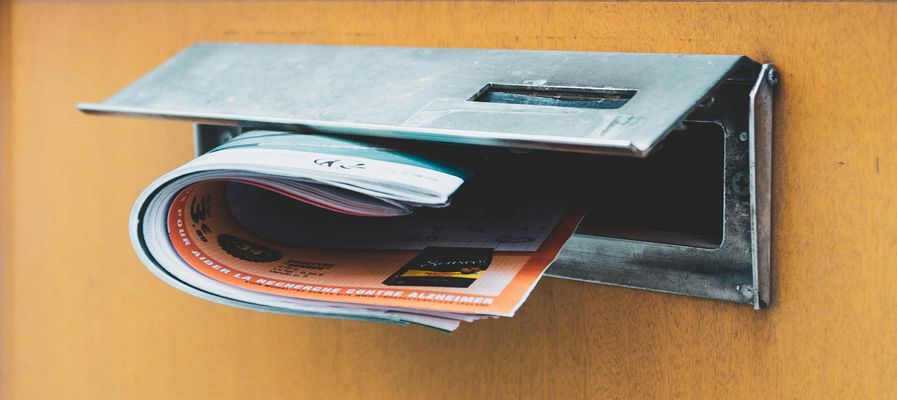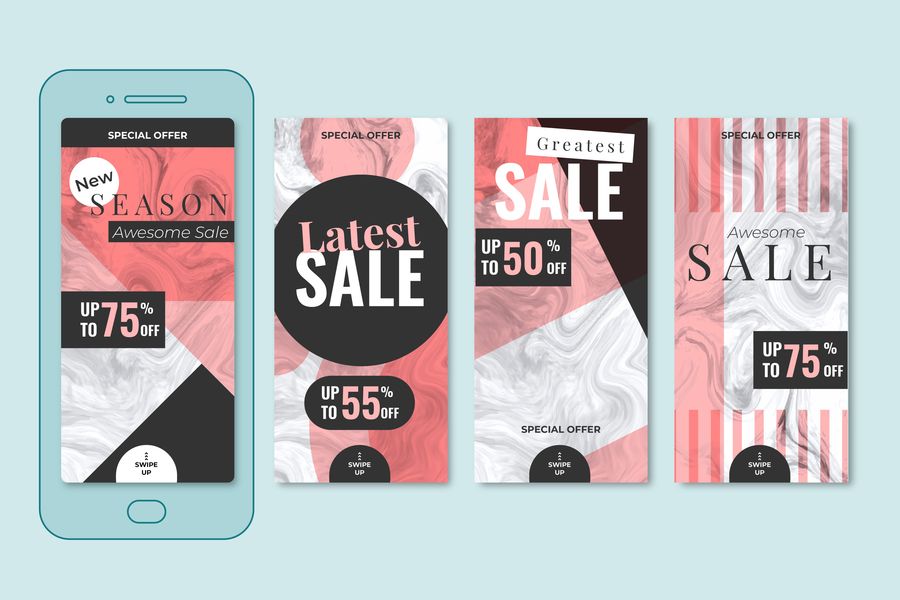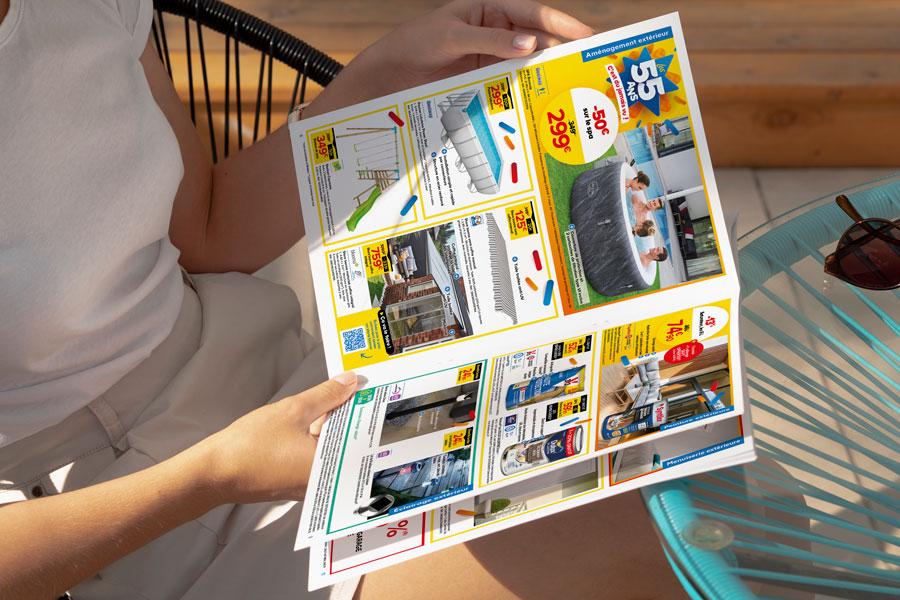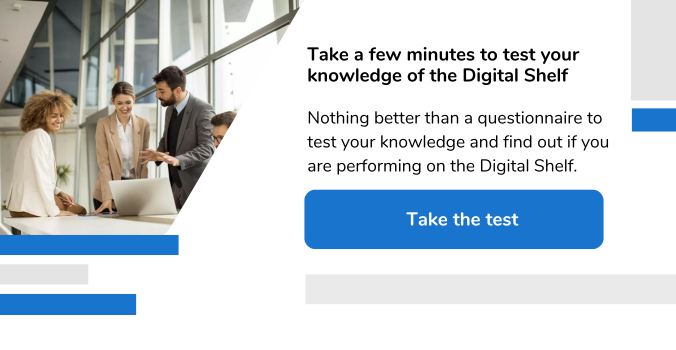Rising paper prices (+40% in one year1), environmental concerns, growth of digital… print catalogs and flyers are « destined to disappear ».
In view of these preoccupations, businesses are increasingly rethinking the design and distribution of their catalogs and printed advertising materials.
Find out about the environmental impact of producing print catalogs and how you can rethink this media and keep winning.
#The environmental impact of print catalogs and brochures
The distribution of print catalogs and advertising materials has a negative impact on the environment. Produced in huge quantities, they inundate our mailboxes with 900,000 tons of brochures2 distributed every year.
#The Stop Pub scheme
In 2004, as part of France's first national waste reduction program, the Stop Pub (stop publicity) scheme aimed to limit the number of « unread printed materials » by giving individuals the means of refusing printed advertising. To show their refusal they could display a specific « no junk mail » sticker on their mailbox.

Despite this new measure, over 766,000 tons of printed advertising was distributed in France in 2021 which is 55.56 pounds per household3, a large proportion of which is discarded unread.
#The Oui Pub scheme
The Oui Pub (yes publicity) scheme was thought up as part of the law on « Climate and Resilience » enacted in August 2021.
A new 3-year experiment is being carried out by 14 local authorities (from May 1, 2022 through April 30, 2025). During this period, several quantitative indicators are being collected (waste tonnage, consumption habits, impact on employment…) to assess the effectiveness of this scheme and decide if it should be generalized in 2025.
Oui Pub operates inversely to the « Stop Pub » scheme. No action is required of individuals who do not wish to receive printed advertising, only those that place a « Oui Pub » sticker on their mailbox will receive unaddressed mail.
As such, Oui Pub is a process that is « consent-based and desired by the consumer4 » comparable to the « opt-in system for email inboxes4 ». The aim is not to put an end to the distribution of printed advertising but to regulate it by printing quantities of catalogs and brochures corresponding to the number of people actually reading them.
#Rethink the role of catalogs and brochures and digitalize them
#Provide printed materials in store
Despite the environmental impact of printed materials and the associated schemes (Oui Pub, Stop Pub…), it is important not to completely overlook printed materials as over 50% of consumers5 prefer this format to any other.
Shoppers use catalogs and printed brochures to get an overview of a brand's product offer. 90% of shoppers6 read catalogs for this reason. Many consumers also like to have a « tangible object » in their hands that they can hold on to for a while (7 days on average6). They also tend to have more confidence in printed materials with 82% of shoppers7 using them to make their final purchasing decision.
This means that businesses are attentive to providing more print catalogs in physical stores. This strategy attracts customers and increases sales as catalogs generate 30 to 35% of in-store traffic8 and flyer campaigns increase the number of new visitors at the point of sale by 9 to 20%8.
#Digitalize your advertising materials
Shoppers have changed how they check for special offers, 69% of them10 now check online for special reductions and coupons, and 43%11 prefer to research special offers through web platforms or mobile apps.

This has resulted in the « Digitalize advertising materials » being prioritized for 82% of retailers12 and businesses are constantly striving to find the best balance between print and digital.
For example, a growing number of retailers are digitalizing their catalogs and using the flipbook format which is an appealing interactive digital version of a product catalog that the user can « flip through online ». They are designed using PDF files which are then enriched by videos, links, animation… Businesses integrating this type of format in their marketing strategies can boost their sales by 20 to 40%13.
#Digital Shelf Promotion: the PIM extension revolutionizing brochures
#PIM: the tool for managing the information in your advertising materials
Product Information Management (PIM) solutions manage all the product information in your catalogs and printed advertising materials: photos, prices, descriptions… and enable you to enrich and validate this information before distribution.
To automate this production, Goaland created the Print extension. Through your database, this extension automatically or semi-automatically generates the production of your printed materials, which you can then adjust to your needs: resizing, framing, placing and sizing of text blocks… and export in different formats and to different distribution channels.
#Transform your advertising with Digital Shelf Promotion
Digital Shelf Promotion is an extension allowing a retailer to replace presentation “flipbooks” by an appealing and responsive website with a selection of products and special offers. Intuitive and user-friendly interface, simple and easy creation of special offers, showcasing of how offers work, links to eCommerce sites and click and collect…
This extension provides businesses with endless possibilities for communicating product promotions and effectively digitalizing advertising materials with optimized ergonomics for mobile devices.
Digital Shelf Promotion, like the other Goaland PIM extensions (Smart Comparison and Analysis, Print, Display…) can also connect to your PIM enabling you to use reliable, detailed and up-to-date information to present your offer.
1
Klein, M. (2023, April 23). Augmentation du prix du papier : en Berry, les maisons d'édition et imprimeurs s'adaptent. francebleu.fr.
2
Veyre, C. (2023, June 9). Fin des prospectus : comment la résistance s'organise pour continuer de vous inonder de publicité. ouest-france.fr.
3
Klein, M. (2023, April 23). Expérimentation « Oui Pub » : des premiers résultats tangibles. ADEME Presse.
4
Richaud, N. (2022, September 5). Gaspillage publicitaire : test grandeur nature pour le dispositif « Oui Pub » . Les Echos.
5
Print marketing statistics : consumers trust, remember, and prefer print ads. (2024, July 25). zipdo.co.
6
Zhang, J. Z. (2020, February 11). Why catalogs are making a comeback. Harvard Business Review.
7
Andre, L. (2024, July 17). 26 Relevant Print Marketing Statistics : 2024 ad spending & impact. Financesonline.com.
8
3ma group. (2023, November 24). L'avenir de l'imprimé publicitaire. 3magroup.com.
9
Setex Société. (2021, September 10). La fin des tracts et catalogues papier approche-t-elle ? ecommercemag.fr.
10
Virtual Incentives. (2022, June 29). 23 surprising stats how online promotions have changed behavior. virtualincentives.com.
11
ITRnews - Le premier quotidien des marchés numériques. (2023, September 20).itrnews.com
12
Puget, Y. (2022, December 14). Digitalisation des prospectus : un enjeu prioritaire pour 82 % des retailers [Baromètre LSA/Bonial].
13
Grosu, D. (2023, January 31). Digital Catalogs in 2024: How retailers Navigate the new digital era. Flipsnack Blog.







